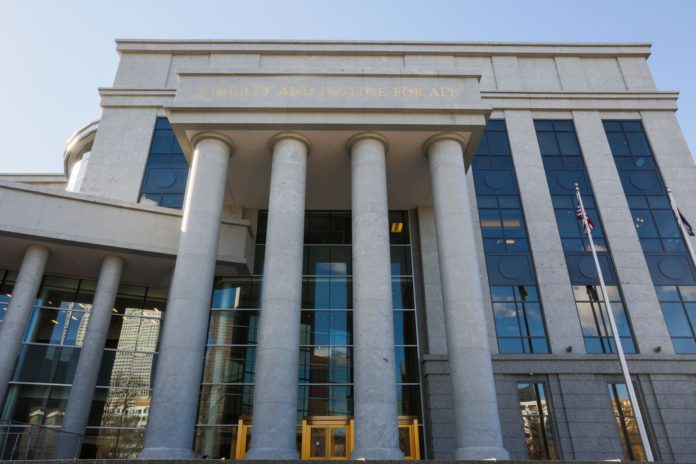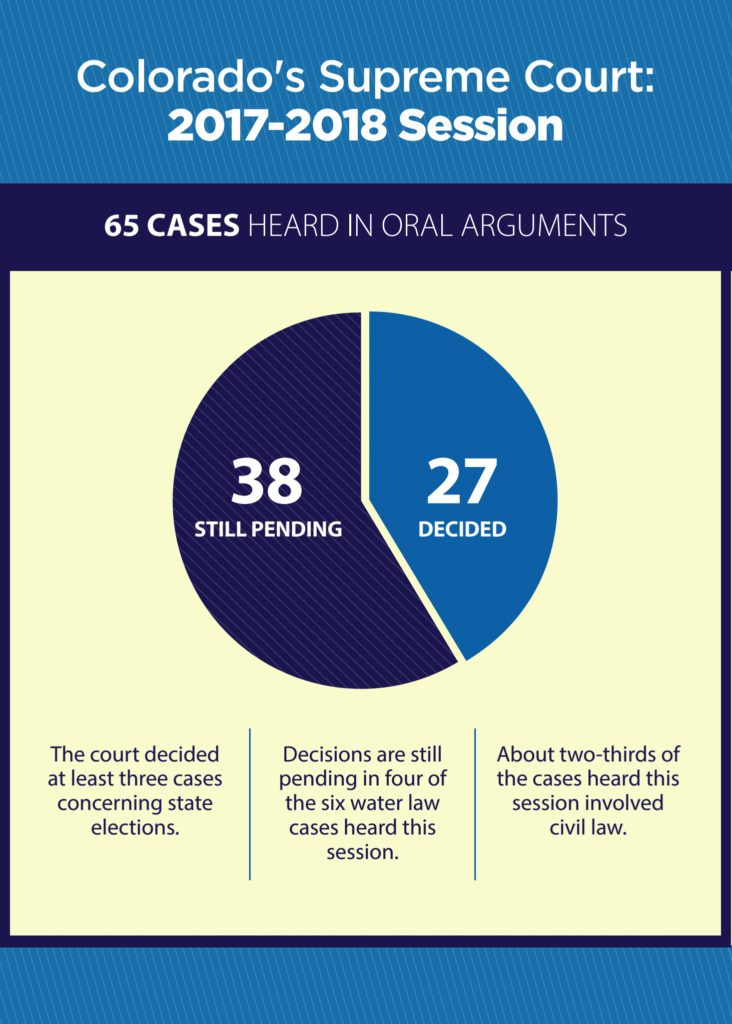
Colorado’s Supreme Court wraps up for a two-month break on June 30 and will keep hearing oral arguments right up through June 27. With the final week of arguments, the court will have heard more than 60 cases since September and has yet to issue opinions in more than half of those.
From the civil docket, the court heard several water law cases, some cases of first impression as well as a handful concerning state elections in advance of Colorado’s midterm elections this fall. But a few criminal cases also have the potential to make waves in existing law.
Below is a roundup of some prominent still-undecided cases from the session in Colorado’s highest court.
Water Law
Consolidated Ditches v. City and County of Denver
Argued: Oct. 19
Issues: “Is water stored by Denver in the Williams Fork Reservoir (“WFR”) under its Nov. 10, 1935 priority subject to the 1940 Agreement? Consolidated Ditches contends that this issue was determined in City &County of Denver v. Consolidated Ditches Co. of District No. 2, 807 P.2d23 (Colo. 1991)?
May Denver avoid the reuse prohibition of the 1940 Agreement by using water stored in WFR under its Nov. 10, 1935 priority as a source of substitute supply in exchange or substitution operations to facilities that have a post-May 1,1940 priority?
Did the Water Court err by conflating the priority date of Denver’s decreed appropriation of exchange potential from WFR to Dillon Reservoir with the priority of the substitute supply from WFR?
Under the ‘character of exchange rule,’ do the obligations and attributes associated with the substitute supply, including contractual limitations, apply to the water diverted by exchange or substitution?
Did the Water Court err by limiting the ‘character of exchange rule’ to the amount and quality of a source of substitute supply?”
Coors Brewing Company v. City of Thornton
Argued: Jan. 9
Issues: “Whether the Water Court erred in holding that, as a matter of law, Coors may not add explicit rights of reuse or successive use for the effluent Coors generates from its fully augmented, out-of-priority diversions by amending its Augmentation Decrees, and that Coors may only obtain rights of reuse or successive use for its effluent from such diversions through a new, independent appropriation.
Whether the Water Court erred in concluding that the effluent or return flows Coors generates by using its fully augmented, out-of-priority diversions are subject to appropriation by other water users, like return flows from in-priority diversions of native water.
Whether the Water Court erred in interpreting Coors’s Augmentation Decrees to require permanent dedication of effluent or return flows to the stream, even when not needed to offset or replace out-of-priority depletions that have been fully augmented.”
Cases of First Impression
In re Marriage of Rooks
Argued: Jan. 9
Issues: “Whether the Court of Appeals erred in applying an abuse of discretion standard of review in reviewing the trial court’s determination of the disposition of a couple’s cryogenically frozen pre-embryos in a dissolution of marriage.
Whether, in the absence of an agreement between the parties, the Court of Appeals erred in its adoption of the balancing of interests approach to determine the disposition of the parties’ cryogenically frozen pre-embryos in a dissolution of marriage.”
The Colorado Supreme Court has been asked to consider how to balance one person’s constitutional right to have or not to have children.
The Colorado Court of Appeals ruled in favor of respondent Drake Rooks, who did not have an interest in having more biological children with ex-wife Mandy Rooks.
The issue for the courts is which parent has control over their cryogenically frozen embryos.
Calvert v. Mayberry
Argued: Feb. 14
Issues: “Whether a contract between an attorney and his client that was formed in violation of Rule 1.8(a) of the Colorado Rules of Professional Conduct is void as against public policy. Whether the doctrine of issue preclusion can bar a disbarred attorney from relitigating in a civil suit against his former client factual issues decided by the attorney disciplinary hearing board, and whether the hearing board’s finding that the attorney-plaintiff violated Rule 1.8(a) of the Colorado Rules of Professional Conduct constitutes a factual issue for purposes of issue preclusion.Whether sanctions against the attorney for groundless and frivolous litigation stand.”
In a case that has seen a disbarred attorney suing his former client over loaned money, the Colorado Court of Appeals determined issue preclusion prohibited petitioner David Calvert from bringing up factual issues that had been decided by the attorney disciplinary hearing board, because he had violated Colorado Rule of Professional Conduct 1.8(a) when he engaged in the same conduct that he claimed was the substance of the oral contract between him and client Diane Mayberry.
The appeals court also determined Rule 1.8(a) is a matter of public policy because it protects the public, rather than the legal profession.
Przekurat v. Torres
Argued: May 10
Issues: “Whether the Court of Appeals negated the duty imposed by H.B. 05-1183 (C.R.S. §12-47-801(4)(a)(I)) upon social hosts not to provide ‘a place’ for underage drinking where the hosts threw a party and opened the venue to anyone of any age by requiring ‘actual knowledge’ of a specific guest’s age.”
The Court of Appeals affirmed summary judgment granted by the trial court in favor of the hosts of a party in which an underage person drank and then seriously injured his passenger in a car wreck. The appeals court found the hosts not liable for Jared Przekurat’s injuries caused by Hank Sieck.
The Criminal Docket
People v. Stellabotte
Argued: April 11
Issues: “Whether the Court of Appeals erred in holding that an amendment to a statute that does not specify whether it applies prospectively or retroactively applies retroactively to cases that are pending when the amendment was enacted.”
The Colorado Court of Appeals ruled defendants in two cases, one involving vehicles and the other unauthorized debit card use, should benefit from a statutory change downgrading theft between $5,000 and $20,000 from a Class 4 to a Class 5 felony and receive shorter sentences as a result. The defendants committed their respective crimes before the statutory change but were sentenced after it took place.

State Elections
The Supreme Court has already decided cases before it concerning state elections. Cases of this type are garnering the attention of the courts with Colorado’s impending midterm elections this fall.
Kuhn v. Williams (Intervenor-Appellee: Lamborn for
Congress)
Decided: April 23, Modified May 14
Issues: The Colorado Supreme Court did not hear arguments in the case, instead deciding it on expedited appeal using the Colorado Election Code. The court found Secretary of State Wayne Williams cannot certify incumbent Representative Doug Lamborn on the 2018 Republican primary ballot for Colorado’s Fifth Congressional District.
The court held Williams correctly relied on the circulator’s affidavit and information in the voter registration system in verifying the petition. Petitioners Michael Kuhn, Ashlee Springer, Lydia Honken, Jeremy Isaac, and Sharon Schafer have the right to challenge the validity of the petition of voters’ signatures before Lamborn’s name is put on the ballot. The Petitioners gave good evidence to the district court challenging the residence of the petition circulators. The Supreme Court ruled the district court should not have focused on the circulator’s intent to move back to CO, and should have focused on the test in section 1-2-102 of the Colorado Revised Statutes (1. A residence is where the person intends to return to no matter how long they are gone 2. Homeless people will have their mailing address be their residence 3. Residence for voting purposes will be the same as given vehicle registration or income tax purposes 4.
A person with a home outside the state is not a resident 5. A person loses CO residence when they move to another state with intention to make it their permanent residence.
The Supreme Court applied that test and found the challenged circulator was not a resident when he was with the Lamborn campaign.
The court reversed the district court’s ruling to the contrary. The court found the circulator’s signatures were invalid, reducing Lamborn’s signatures to below the 1,000 needed to be on the primary ballot. The court did not reach the Campaign’s arguments about the constitutionality of the residency requirement because it lacks jurisdiction on the issue.
— Julia Cardi. Connor Craven contributed reporting to this story.

